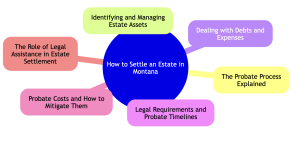How to Settle an Estate: Honoring the Deceased
To settle an estate in Montana, families must understand state-specific probate laws to guarantee the deceased’s wishes are honored and that legal requirements are met.
Legal guidance is recommended. For many, this can be an overwhelming and burdensome task.
Estate planning attorneys like the experienced folks at Montana Elder Law can significantly reduce the weight these matters have on your mind.
Key Takeaways
- Probate is essential for legally transferring assets in Montana.
- Legal advice can significantly simplify the probate process.
- Montana offers streamlined procedures for smaller estates.
- Proper planning can minimize probate complexities.
- Timely action and compliance with legal procedures lead to a smooth estate settlement.
What is Probate?
Probate is a legal process required to settle an estate. It distributes the estate’s assets according to the deceased’s will – or state law if no will exists.
This procedure validates the will, pays off debts, and distributes assets under court supervision.
It’s designed to protect the interests of beneficiaries, creditors, and the estate itself. By adhering to the Montana Uniform Probate Code, executors can execute the probate process successfully and accurately – so the estate is settled in a timely manner with no snags.
The Probate Process Explained
The probate process in Montana begins with filing a petition in district court and ends with the distribution of the estate’s assets to the rightful heirs.
This legal procedure guarantees the payment of the deceased’s debts and honors their wishes as stated in their will. It involves several detailed steps, managed under the court’s supervision, to safeguard the interests of all parties involved.
- File a Petition: Start by submitting a probate petition to the local district court.
- Notice to Heirs and Creditors: Legally notify all potential heirs and creditors of the probate proceeding.
- Appoint an Executor: The court appoints an executor or administrator to oversee the estate.
- Inventory Assets: The executor inventories the estate’s assets.
- Pay Debts and Taxes: Settle the estate’s debts, taxes, and expenses.
- Distribute Assets: Distribute the remaining assets according to the will or state law.
- Close the Estate: Finalize the process with a court order closing the estate.
How to Settle an Estate: Identifying and Managing Estate Assets
Inventorying Assets
Inventorying assets is important in any estate. Inventories are where all property, accounts, and valuables are cataloged.
This includes appraising items to determine their market value – which is essential for fair distribution and debt settlement.
Assets Subject to Probate
Not all assets need to go through probate.
Real estate, personal belongings, and accounts without designated beneficiaries typically require probate, while items like life insurance payouts often bypass this process.
Effective estate planning can reduce the probate burden.
Montana Probate: Simplified Procedures for Small Estates
Montana law allows smaller estates, usually those valued under a specific threshold, to go through a simplified probate process.
This expedited procedure reduces time, cost, and complexity, making it easier for heirs to receive their inheritance. (1)
How to Settle an Estate: Dealing with Debts and Expenses
Managing an estate’s debts and expenses involves a clear, organized approach. The executor must identify all outstanding obligations, notify creditors, and make sure debts are paid from the estate’s assets.
- Funeral and burial costs: Prioritize these as immediate expenses.
- Outstanding bills and loans: Settle any remaining bills and personal loans.
- Taxes: Pay any estate or inheritance taxes due.
- Legal and court fees: Cover the costs of legal advice and court filings.
- Distribution to heirs: What remains goes to the rightful heirs according to the will or state laws.
Legal Requirements and Probate Timelines
Montana’s probate laws require filing a petition with the district court to initiate probate, starting the process of estate settlement.
Timelines are strict: Notices to creditors must be published, allowing them a set period to make claims against the estate. Acting quickly and within legal timelines leads to a smoother process and avoids unnecessary delays in distributing the deceased’s assets.
Probate Costs and How to Mitigate Them
Probate involves various costs, including court fees, legal counsel, and administrative expenses. These can add up, impacting the estate’s value passed on to the heirs.
- Choose simplified probate for small estates to reduce fees and paperwork.
- Use a living trust to bypass probate for many assets, saving time and money.
- Inventory assets accurately to avoid overestimation and excessive fees.
- Settle debts efficiently to minimize administrative costs.
- Seek competitive legal advice to get quality services at reasonable rates.
The Role of Legal Assistance in Estate Settlement
Securing legal assistance for estate settlement in Montana is invaluable.
From the outset, a knowledgeable attorney can accurately guide executors through the probate process.
They provide clarity on the estate’s obligations to creditors and help navigate the distribution of assets according to the will or state law. Beyond mere guidance, legal professionals offer peace of mind – they make sure the estate is settled fairly and efficiently, reducing the burden on the executor and beneficiaries alike.
Final Thoughts: Your Partner to Settle an Estate in Montana
Settling an estate in Montana requires a thorough understanding of probate laws to guarantee assets are distributed fairly and debts are settled.
The process can be complex, but with the right strategies and knowledge, it’s manageable.
Legal advice plays a significant role in minimizing stress for the parties involved.
Montana Elder Law has helped many families settle their estates.
We understand that these matters represent only a fraction of what someone thinks about when settling an estate. Worrying about legal obstacles is the last thing anyone wants.
Montana Elder Law is here for families. Call today!
Reference:
(1) Montana State University, Settling an Estate: What Do I Need to Know?, https://www.montana.edu/estateplanning/mt201004hr.html#:~:text=When%20an%20individual%20dies%2C%20with,deceased%20was%20considered%20a%20resident.





